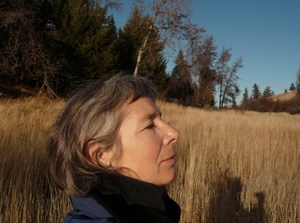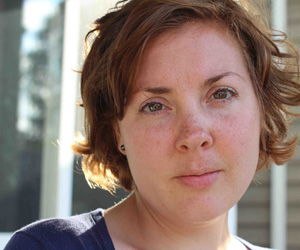The Past Becomes Story: Karen Bannister in Conversation with Susan Buis

Malahat volunteer Karen Bannister talks with Susan Buis on life after winning the 2013 Open Season Award for Creative Nonfiction for her piece, "The Falling House."
First, let me say it is a pleasure to chat with you. Your story "The Falling House" gave me tingles. I relished it as I relish poetry, for the vibrancy of the words.
Thanks so much, and it is my pleasure to exchange thoughts with you.
Your training as a poet has impacted your prose writing, and I can sense this when reading this story. In what ways might you say the reverse is true?
Writing prose helps me combat the tendency to wordiness in my poetry, but one of the most effective and unexpected writing lessons came when I was assigned to teach business and technical writing—which I had no training in at all. So I read a few textbooks, stayed a few steps ahead of the students, and the lessons really improved the grammar and concision of my own writing, although for creative writing, the technical voice has to be reined in. A wise poet pointed out that a technical voice was butting into my poems and advised me to shoo it away. There is nothing like writing instructions and reports to make you love prose and poetry, figurative language and layered meaning, even more desperately.
How has the realization of this story impacted you, and the writing you have gone on to do, in the past year?
After a piece is written I try to leave it undisturbed, to settle, conceptually as well as on the page. But I think it continues to reverberate unconsciously and to nudge new pieces into being.
It has been one year since "The Falling House" won the Malahat’s Open Season Award for Creative Nonfiction. First let me ask, what has this year been like for you?
Receiving an award is very good for the old self-confidence—such a powerful factor in the production of new work, and for trust in decisions and instincts. It’s been a year of accomplishment and momentum; I’m happy with some of the writing (I should knock on wood or throw salt or something), which helps to balance those times when the work is snagged and frustrating. Rejection letters just make me feel crappy for a bit, then I dig in and work harder.
How have you grown as a writer and what projects have dominated your writing practice?
I’ve gotten serious about the production of my first poetry manuscript and scrapped a lot of the older writing. That was daunting, but resulted in better work. The confidence to lose some preciousness, not cling to the work, gave me the impetus to start anew. Some themes that have preoccupied me are a newfound love of winter, the complexity of desire with age, desire and landscape.
Then, let me ask what impact the award has had on you?
Honestly, to be published in The Malahat Review has been a goal for a few years now, so it feels pretty darn good. The confidence boost goes a long way, but praise is a transient thing. I try to maintain equanimity—and persistence. I enjoyed working with John Barton, MR’s editor; his clear eye helped improve “The Falling House” and I learned a lot from the editing experience.
When you last spoke with The Malahat Review, you mentioned an upcoming residency at The Banff Centre. Would you like to tell us how that went for you? Why it was an important endeavor?
For me the residency was a real game-changer. It was a time for extended focus—and I learned to sit still. I lived like a monastic behind my Do not Disturb sign (mostly). It seemed that the world outside Banff had fallen away. This was one of the few times in my life when I had no responsibilities other than to myself and the work— I didn’t even have to make my bed! The faculty were exceptional, and generous with feedback, and the other participants were gifted and supportive. Here is a link to a video of some residency participants discussing our work spaces and habits.
I love the juxtaposition the piece has between your old life with your new life. In what ways might that be true of where you were when you wrote this piece, and where you are now? Have you gone back to "The Falling House" to re-read it or consider it retrospectively? I’m curious to know what ways you think it marks a time in your life.
Because memory and imagination are one, the past becomes a story. This story is told by a persona who is looking at herself as a previous incarnation, a different character. This loosening of attachment to the past offers a perspective with much creative potential, as well as a release from the past’s weight. I enjoy the fact that the narrator doesn’t judge her characters at least that was my intention.
If you were ever a contest judge, what qualities in a piece of writing would you look for?
The speaker’s voice is the component of work that most draws me in. For me, little needs to happen in a story or poem; it’s the voice of the teller that compels. I am intrigued by a speaker who desires, yearns, who is imperfect, complex and puzzled by the world, who has no answers. I also enjoy a speaker who is genuinely humorous (which I understand is not easy to do). That words can evoke phenomena and consciousness astonishes me.

Karen Bannister
* * * * * * * *
Read more about Susan Buis's winning CNF story here.









